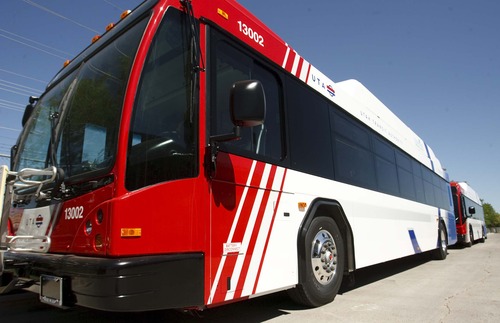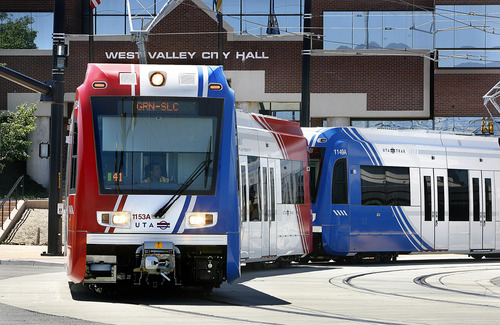This is an archived article that was published on sltrib.com in 2013, and information in the article may be outdated. It is provided only for personal research purposes and may not be reprinted.
The Utah Transit Authority told legislators Wednesday that it will soon need a 66 percent increase in its share of sales taxes to fund service improvements that it figures the growing Wasatch Front will need over the next 30 years.
That would raise its share of transit sales tax in areas served by UTA from an average of six-tenths of a cent up to a full penny for every $1 spent. But the increase would be more in some areas than others because transit sales tax now varies among counties. It is 0.69 of a cent in Salt Lake County, for example, 0.55 in Davis and Weber counties and 0.53 in Utah County.
Sales tax currently provides two-thirds of all UTA revenue.
The transit authority's news publicly upset one legislator, who said before UTA seeks such a share increase it should cut big bonuses and salaries for its executives that have been in the news recently.
"I'm not about to vote for an increase as long as we read about these enormous bonuses given by UTA … for people just doing their damn job," said Rep. Janice Fisher, D-West Valley City. "I think you guys have got a problem."
The Salt Lake Tribune reported this month that top UTA executives split $750,000 in bonuses last year by meeting goals that critics say are too easily met. Even former UTA Chief Executive Officer John Inglish received a $22,700 bonus even though his then-mostly advisory job had him mainly traveling to represent UTA at industry meetings, while receiving other compensation of $364,000 a year.
UTA General Counsel Bruce Jones — who received a $25,000 bonus beyond his other wages and benefits of $287,794 — told the Transportation Interim Committee that future improvements UTA has included in a unified state transportation plan for 2040 assume that the transit's sales tax share will be raised to a full cent per dollar in sales.
He explained that for UTA to afford operating numerous new rail projects to allow better future capacity — including TRAX extensions to the airport, South Jordan, Draper and West Valley City, and a FrontRunner extension between Provo and Salt Lake City — it had to cut many bus operations, especially at night and on weekends.
He said UTA could operate the new rail line and reduced bus service without a share increase, "but it would not permit the additional capital projects that we feel the community is insisting upon. And we think a good transit system would include a restoration of some of the bus services … not presently in our plan."
Jones said comparable transit systems in such areas as Denver, Dallas, San Jose, Houston, Atlanta and Austin all have transit sales tax of 1 cent per $1 dollar in sales. He said the Wasatch Front's population is expected to grow by 65 percent by 2040, so an increase to that level is needed here to meet growing demands.
He said the Legislature would need to raise caps on sales tax for such a share increase. UTA would then need to persuade officials to put a tax increase on the ballot, and voters would need to approve it.
UTA ridership is at historic highs, but has been stagnant over the past year even as the new FrontRunner line to Provo and the new airport TRAX line opened. Fisher asked if UTA planned more such big projects, or would refocus on restoring reduced bus service.
"Restoration of bus service is a number one priority," Jones said. He added that if UTA receives a full cent in sales tax, "the bus service that has been deficient would be restored."
He added, "A huge portion of that increase would be for bus service. Historically, that has not been as politically attractive as a new rail line. But we know from our surveying that people are insisting upon better bus service."
Claire Geddes, an activist who has long been critical of UTA, told legislators, "We ravaged the bus system to put in a rail line that most people can't get to, and ridership is static or down. … I'll be dead set against giving them one dime until we see a complete overhaul" of UTA.
The committee took UTA's request under advisement. It is also considering how to fund other projected growing highway and transportation needs, and has already heard requests from local governments to approve increases in gasoline taxes to improve roads.





